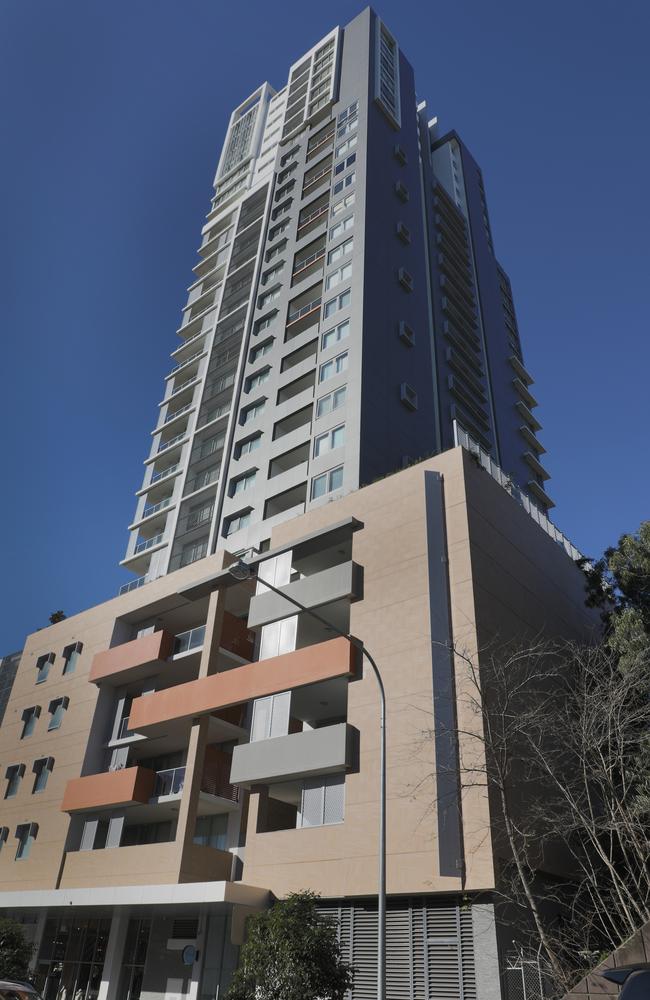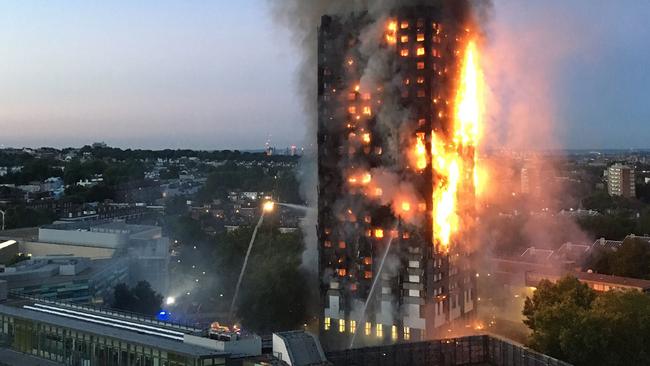Parramatta Rise owners suing builders over ‘combustible, illegal’ cladding
Owners of a high-rise apartment block in Parramatta are taking its builders to court, with the NSW-first legal action claiming the aluminium cladding on the 28-storey tower is combustible and now illegal in NSW.
Apartment owners of a high-rise covered in a similar cladding to the type which caught fire and engulfed London’s Grenfell Tower are suing its builders in what is believed to be the first legal action of its kind in NSW.
The Daily Telegraph can reveal Parramatta Rise apartment owners are taking legal action against Toplace Construction over the aluminium cladding on the 28-storey tower, which they claim is combustible and now illegal in NSW.
The company is defending the action and argues its cladding is compliant with state laws.

It comes as NSW apartment owners are being quoted up to $80,000 per unit to replace flammable cladding, with the state’s peak strata body warning $1 billion is needed to resolve the “crisis”.
In what is believed the first case of its kind, court documents state Parramatta Rise owners claim the cladding has a polyethylene core between 35 and 40 per cent and is therefore banned under the Building Products (Safety) Act introduced in 2017.
MORE NEWS
How hitman call helped cops expose drugs-by-plane smugglers
Ian Chappell: I’ve had intense cancer treatment
Cap found in hunt for missing backpacker
It is among a raft of more than 100 alleged defects littered throughout the building outlined in the Supreme Court statement of claim.
On top of the cladding, the alleged defects range from an exposed hot water system enclosure to cracking walls.
The building, in Parramatta’s CBD, where one-bedroom units start at more than $500,000, was built in 2015, two years before the Grenfell blaze showed the danger of aluminium cladding with a combustible core.
A Toplace spokesman initially told The Telegraph parts of the building were clad in aluminium with a polyurethane core.
However court documents claim the cladding has a polyethylene core. Both polyurethane and polyethylene are flammable.

Toplace, owned by developer Jean Nassif, admits in its defence to the Supreme Court action that the cladding is Vitrabond FR, but it also claims that even if it does have a polyethylene core greater than 30 per cent it can still be used under the 2017 Act.
Vitrabond FR has been banned in NSW and Victoria for multistorey buildings, along with all aluminium cladding with a polyethylene core greater than 30 per cent.
The Building Products (Safety) Act states it does not matter if the product was used before the ban — the affected building still has to be made safe.
The owners of Strata Plan 92450 launched their action in April, seeking the cost of replacing the cladding along with what they claim are other building problems and additional insurance costs.
“The ACPs (aluminium composite panels) have a core percentage of greater than 30 per cent polyethylene PE (predominantly between 35 per cent and 40 per cent PE core) and as such are deemed to be combustible,” the owners state in court documents obtained by The Daily Telegraph.

They say it was in breach of the statutory building warranties because it does not comply with the building code and “as a result of the installation of the ACPs the building work resulted in dwellings which are not reasonably fit for occupation as dwellings because they are combustible”.
Toplace has stated in its defence that the cladding “in conjunction with the other fire safety features in the building were and remain good and suitable for the purpose for which they are used”.
Both Vitrabond and fellow Alucobond cladding are at the centre of legal actions launched in the Federal Court in Sydney.
Strata Community Association NSW president Chris Duggan said the NSW government should follow the Victorian government’s lead and pledge at least $600 million to fix 650 NSW buildings confirmed as having combustible cladding.
He warned that number was “potentially under-inflated” and that a $1 billion funding package would be “more appropriate”.


